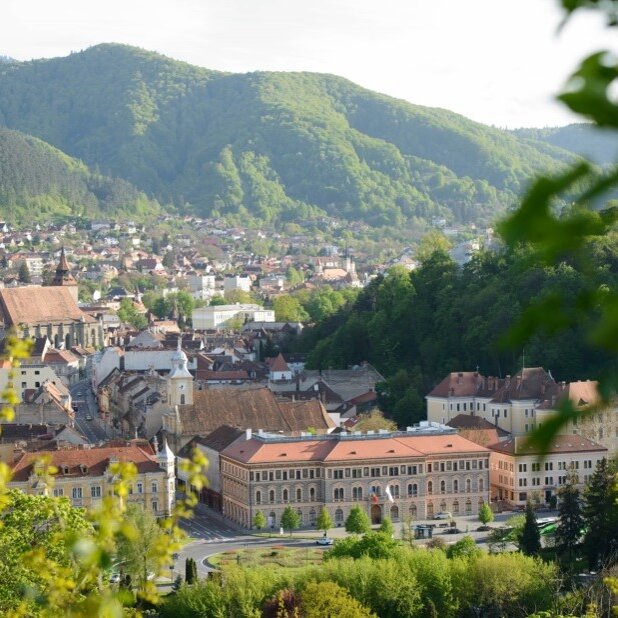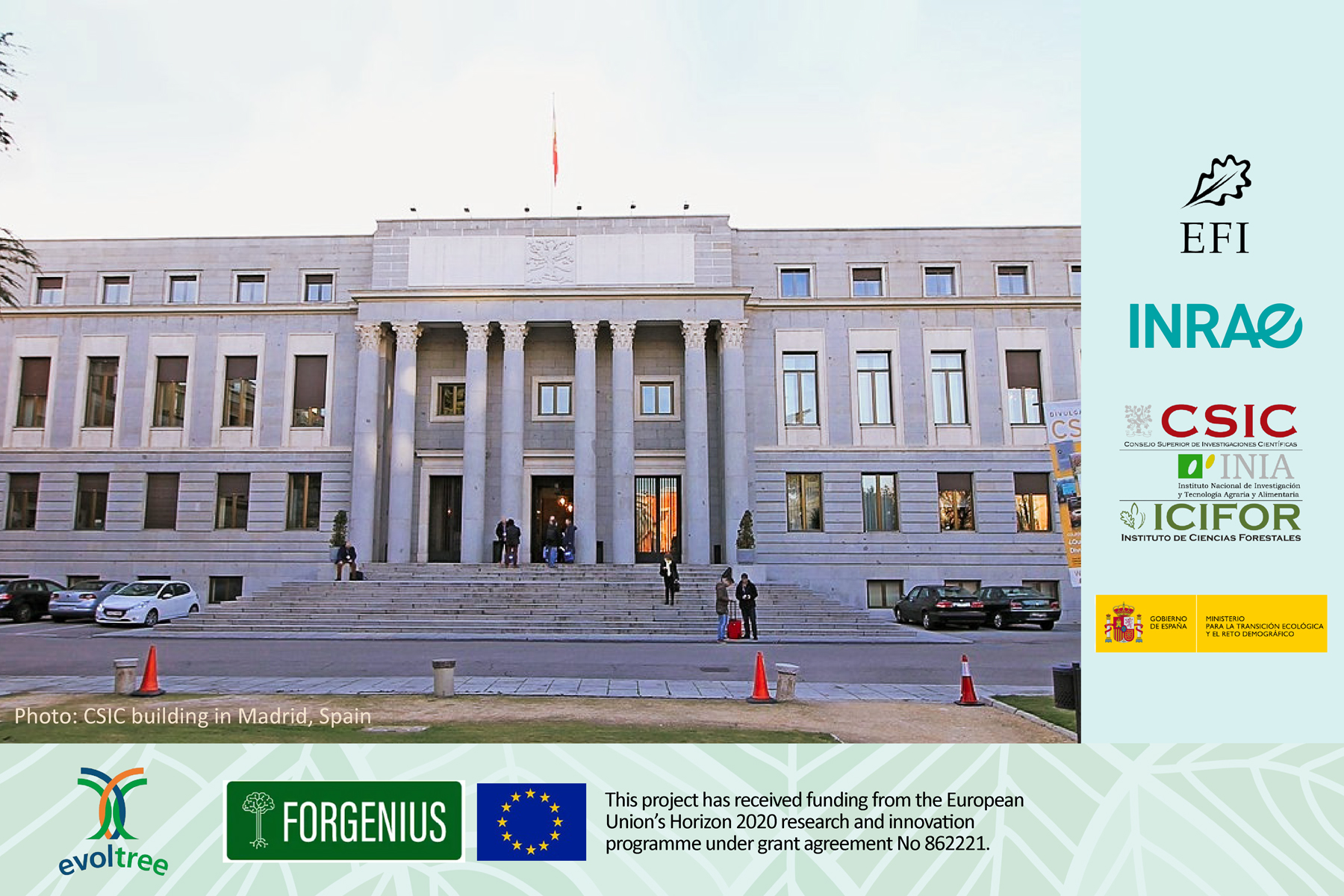Second EVOLTREE Conference 2023 RESILIENT FORESTS FOR THE FUTURE
Brasov, Romania 12-15 September 2023
The second EVOLTREE Conference took place September 12-15, 2023 at the International Conference Center of the Transilvania, University of Brasov (UNITBV) Address: Iuliu Maniu Str. 41A, 500091, Brasov, Romania.
Conference Programme
Book of abstracts (PDF)
EvolTree Conference 2023 – Talks now available on YouTube: The movies of most talks of the EvolTree Conference 2023, which was organised by Transilvania University of Brasov, Romania, are now available on EvolTree YouTube channel. Please visit the following link to watch them: https://www.youtube.com/channel/UCla0sRglK9UUPYp5Ks8hwFA
Each of the six sessions has its own playlist that can be accessed here: https://www.youtube.com/@evoltreenetwork2096/playlists
Conference format: The conference was held in hybrid format (on-site and online). The main program – keynotes, presentations, and poster sessions – took place each afternoon (ca. 12:00 to 18:00 CET). Additional activities such as training lectures, workshops, networking and an excursion were planned for the mornings.
Book of Abstracts (PDF)



Sessions & Keynote

Session 1: Climate resilient forests
Chair: Dr. Katharina Birgit Budde, Georg-August University, Göttingen, Germany
Keynote speaker: Associate Professor Dr. Jill Hamilton, Pennsylvania State University, USA
Title of presentation: Hybrid zones as model systems to examine the genomic basis for climate adaptation
Trees are foundation and keystone species in forest ecosystems and contribute to numerous ecosystem services, such as habitat for associated species, soil formation and water regulation but also timber products. Global climate change is rapidly advancing, especially with respect to long-lived species, such as forest trees. Within the lifetime of a single tree, mean annual temperature is currently expected to rise by 2 -4°C. Apart from that, natural disturbance events, such as prolonged drought periods, heat waves, wind throws, as well as pest and pathogen outbreaks, are likely increasing. Here, resilience refers to the capacity of a forest ecosystem to tolerate and recover from such perturbations while maintaining a similar functioning and structure. Many factors, including species-specific characteristics, biotic interactions as well as management practices, influence forest resilience. Understanding the complex underlying mechanisms and processes affecting forest resilience is therefore crucial to develop suitable mitigation and adaptation strategies. In this interdisciplinary session we encourage contributions from various fields, such as forest genetics and genomics, silviculture, ecology and pathology, to foster a joint discussion about strategies to maintain and enhance forest resilience in the face of global climate change.

Session 2: Tree genomics & biotic interactions under climate change
Chair: Dr. Hilke Schröder, the Thünen Institute, Germany
Keynote speaker: Professor Nathan G. Swenson, University of Notre Dame, USA
Title of presentation: Functional genomics as a window into the drivers community structure and dynamics in temperate and tropical forests
Neither individuals, nor populations or species exist on its own. We already know that since centuries. But, we first needed the tools to analyse ecosystems as a single entity. During the last decades, scientists all around the world analysed parts of communities as host-parasite interactions or fungal communities and its impact on host species. And so, step by step we move closer to the goal of analysing whole communities. When Whitham adopted the concept of the “extended phenotype”, he developed a framework for community and ecosystem genetics that led us the way. Community genetics already focus on multiple species rather than on individuals or populations. Now, with the opportunity to use genomics tools, we can go ahead the next (hopefully big) step to analyse communities. In this session, we welcome studies dealing with the analysis of communities using any kind of next generation sequencing methods.

Session 3: Evolutionary genomics
Chair: Dr. Annika Perry, UK Centre for Ecology & Hydrology, UK
Keynote speaker: Dr. Brandon Lind, The University of British Columbia, Canada
Title of presentation: Using genomics to predict maladaptation to future climates
The use of genomic data to study evolutionary processes has advanced our understanding of adaptation and in turn has significant implications for the management and conservation of forest trees, their associated organisms, and hence entire forest ecosystems in a changing climate. However, it is important to consider the many underlying complexities (such as gene flow, drift, demographic processes, biotic interactions) as well as the inherent uncertainties in these systems which can impact the interpretation of results from these approaches. In this session we will explore evolutionary genomics methods which have revealed how species and populations are shaped by selection and how this knowledge can be used to inform forest management practices and to forecast changes in forest dynamics. We welcome genomic studies which provide insight into these topics – whether applying phenotype and/or climate data, using practical or simulated experiments.

Session 4: Innovative methods and approaches
Chair: Dr. Christian Rellstab, WSL, Switzerland
Keynote speaker: Prof. Dr. Meredith Christine Schuman, University of Zurich, Switzerland
Title of presentation: Leveraging remote sensing to support assessment of genetic variation in beech forests
This session will discuss innovations which promise to support forest resilience. These may include the active management of biodiversity, from genomes and epigenomes to species and their interaction; optical and chemical remote sensing technologies; smart sensors; interactions with local communities; management of soil health; monitoring schemes; and policy-relevant action.

Session 5: Conservation genomics
Chair: Prof. Dr. F.A. (Phil) Aravanopoulos, University of Thessaloniki, Greece
Keynote speaker: Ivan Scotti, INRAE, France
Title of presentation: Resilience: can we define it in an evolutionary framework?
The transition from the Holocene to Anthropocene and from climatic change to climatic crisis, fuels the frequency and intensity of natural and anthropogenic disturbances. In turn, they lead to major threats regarding the sustainability and functioning of forest ecosystems and the services they provide. Extant genetic diversity is paramount for determining future adaptive potential; it provides the raw material for evolution. Hence, the conservation of genetic diversity is more important than ever, while the means to do so are probably better than before with the advent of genomic (and epigenomic) approaches. In concordance to the Conference Theme, this Session will address how conservation genomics can improve resilience. In particular, the Session aims to highlight research on the challenges and applications of population-level conservation genomics, and focus on issues such as understanding the extend, structure and patterns of genomic diversity, identifying islands of high or low genomic diversity, pinpointing signals of local adaptation, and providing improved estimations of effective population size.

Session 6: Tree breeding and sustainable use of forest genetic resources
Chair: Associate Professor Dr. Ole Kim Hansen, University of Copenhagen, Denmark
Keynote speaker: Leopoldo Sánchez-Rodríguez, INRAE, France
Title of presentation: B4EST: a collaborative research effort on adaptive BREEDING for productive, sustainable and resilient FORESTs under climate change
Tree breeding has a proven track-record of delivering increased forest productivity and wood quality. However, climate change calls for more focus on breeding for resistance to biotic and abiotic stress factors – e.g., new pests and drought. To create new resilient forests, introduction of new species is an evident option. Tree breeders should breed those species with novel approaches and methods, as there will not be resources and time to establish traditional breeding programs for all. Global plans for a huge increase in afforestation stresses the need to exploit existing breeding program and seed sources, to cover the increased demand for forest reproductive material. There will also be a demand for tree genetic knowledge in the management of existing forest to bring them through the transition phase of the climate change and preparing them for the future. We welcome contributions that cover the above-mentioned issues or can be related to these.
Program
Second EVOLTREE Conference - Programme (PDF) (update 7 September).
Logistics
Venue
International Conference Center of the Transilvania University of Brasov (UNITBV)
Brasov is located in central Romania and can be reached by plane from various cities in Europe or by train (2h 30 min from Bucharest). Henri Coandă Otopeni international airport is located 12 km north of Bucharest.
The venue of the conference is close to the center of Brasov, a very popular city with numerous hotels.
Organization
Organizing committee (contact us if you have questions, lucian.curtu@unitbv.ro):
Alexandru Lucian Curtu, UNITBV
Elena Ciocirlan, UNITBV
Nicolae Sofletea, UNITBV
Scientific committee:
Prof. Dr. F.A. (Phil) Aravanopoulos, University of Thessaloniki, Greece
Dr. Katharina Birgit Budde, Georg-August University, Göttingen, Germany
Prof. Dr. Alexandru Lucian Curtu, Transilvania University of Brasov, Romania
Dr. Felix Gugerli, WSL Birmensdorf, Switzerland
Associate Professor Dr. Ole Kim Hansen, University of Copenhagen, Denmark
Dr. Annika Perry, UK Centre for Ecology & Hydrology, UK
Dr. Christian Rellstab, WSL Birmensdorf, Switzerland
Dr. Hilke Schröder, the Thünen Institute, Germany
Evoltree Working Group "Biannual Evoltree Conference"
Prof. Dr. Alexandru Lucian Curtu, Transilvania University of Brasov, Romania
Dr. Felix Gugerli, WSL Birmensdorf, Switzerland (head)
Prof. Dr. Katrin Heer, Albert-Ludwigs Universität Freiburg, Germany
Dr. Miran Lanšćak, Croatian Forest Research Institute, Jastrebarsko, Croatia
Dr. Sanna Olsson, INIA Madrid, Spain
Dr. Annika Perry, UK Centre for Ecology & Hydrology, Edinburgh, UK
Prof. Dr. Tanja Pyhäjärvi, University of Helsinki, Finland
Dr. Christian Rellstab, WSL Birmensdorf, Switzerland
Dr. Nataša Šibanc, Slovenian Forestry Institute, Ljubljana, Slovenia
Dr. Giovanni Giuseppe Vendramin, CNR-IBBR, Florence, Italy
Registration and Info
Invoice
Please send an e-mail to Dr. Elena Ciocirlan (E-mail: ciocirlan.elena@unitbv.ro). Following information is needed: name, address and VAT number of your organization. The invoice will be sent by email.
Payment information
BANK ACCOUNT HOLDER: Universitatea Transilvania din Brasov
FISCAL NUMBER: 4317754
IBAN: RO23BTRLEURCRT0006359506
SWIFT: BTRLRO22
NAME OF THE BANK: Banca Transilvania Sucursala Brasov
ADDRESS OF THE BANK: Str. 13 Decembrie nr. 17, Brasov - 500199, Romania
CURRENCY: EUR
PAYMENT REFERENCE: Evoltree conference fee




